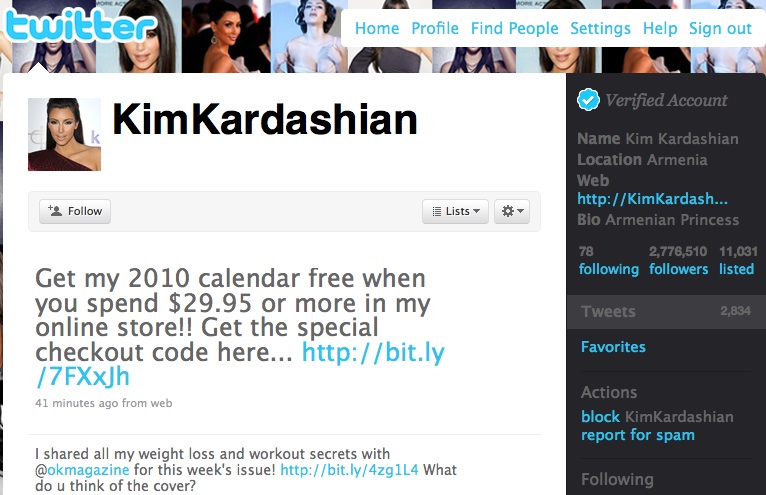 Last week, celebrity, model, socialite, and actress Kim Kardashian found herself in diet hell. Dr. Sanford Siegal, creator of the "Cookie Diet," and his Company, Dr. Siegal's Direct Nutritionals, LLC, filed a lawsuit against Kardashian in the 11th Judicial Circuit Court in Miami, Florida, for allegedly publishing false and defamatory statements to her immensely popular twitter account.
Last week, celebrity, model, socialite, and actress Kim Kardashian found herself in diet hell. Dr. Sanford Siegal, creator of the "Cookie Diet," and his Company, Dr. Siegal's Direct Nutritionals, LLC, filed a lawsuit against Kardashian in the 11th Judicial Circuit Court in Miami, Florida, for allegedly publishing false and defamatory statements to her immensely popular twitter account.
According to the complaint, Dr. Siegal's company sent diet samples to Kardashian's publicist last Spring after the company's CEO read an article claiming Kardashian, and other celebrities, had lost weight using the cookie diet. The complaint states that neither Kardashian nor her publicist confirmed or denied the accuracy of the article, but acknowledged they received the samples. Subsequently, the company posted a hyperlink on its website, alongside other news articles written about the diet, to a subsequent article that again stated that Kardashian and other celebrities had lost weight using the cookie diet.
On October 29, 2009, two tweets posted to Kardashian's Twitter account:
14(a). Dr. Siegal's Cookie Diet is falsely promoting that I'm on this diet. NOT TRUE! I would never do this unhealthy diet! I do QuickTrim!
14(b). If this Dr. Siegal is lying about me being on this diet, what else are they lying about? Not cool!
More than a month later, on December 11, 2009, Kardashian's legal team took aim at the hyperlink and sent a cease and desist letter to Dr. Siegel's company, which, according to the complaint, promptly removed the hyperlink despite (apparently) not having a legal obligation to do so.
On December 28th, 2009, Dr. Siegal and his company fired back by filing this suit, focusing the substance of the defamation claims on Kardashian's assertions that the cookie diet is "unhealthy" and "Dr. Siegal is a liar" (you'll note this is not what the second tweet said). In addition to alleging that these two statements were defamatory and inaccurate, the complaint claims that Kardashian had a commercial motive to defame Dr. Siegal and his company because Kardashian has an endorsement relationship with a competing diet product, QuickTrim, which relationship was not disclosed in the tweets at issue.
The defamation claims could be challenging. As Wendy Davis of MediaPost notes:
It's not clear that Kardashian's alleged statements about the diet being unhealthy, or about Siegal "lying" regarding Kardashian's use of products, are libelous. For one thing, Kardashian's alleged statement that the diet is "unhealthy" might be viewed as an opinion, and only statements of facts can be libelous. In addition, the alleged statement that Siegal was "lying" about Kardashian might not be the type of remark that's likely to damage Siegal's reputation.
Julie Hilden at FindLaw makes a similar point about the "unhealthy" comment. Plus, Dr. Siegal may well be a "public figure," at least when it comes to diet controversies, so he could have to show that Kardashian made the statements with actual malice—knowing or reckless disregard for the statements' truth or falsity—always a challenging endeavor.
Mike Masnick at Techdirt points out another interesting aspect of the case. According to one source, Kardashian's Twitter account, which has some 2.7 million followers, commands as much as $10,000 for product endorsement tweets. Although the lawsuit doesn't specifically bring up the Federal Trade Commission's new product endorsement disclosure requirements, the fact pattern does raise the issue in a law-school-exam kind of way.
The FTC's new guidelines require bloggers, tweeters, and Facebook users to disclose "material connections" they have with companies whose products and services they endorse. And if Kardashian is getting paid a hefty sum to endorse QuickTrim, her little quip—"I do QuickTrim!"—is precisely the sort of tweet for which the FTC wants to see disclosure. But the issue is totally academic because Dr. Siegal has no authority to enforce the FTC's guidelines, and Kardashian published her comments in October, before the guidelines became effective on December 1. Still, this is an interesting example of the kind of high profile and lucrative social media endorsement the FTC might take an interest in.
If you're interested in this topic, be sure to check out CMLP's guide to Publishing Product or Service Endorsements, which is designed to help social media users understand and comply with the new requirements. And if you just can't get enough cookies, you can monitor developments in the case through CMLP's database entry, Siegal v. Kardashian.
(David O'Brien is an attorney and former CMLP Legal Intern. David received his J.D. from Northeastern University School of Law in 2009.)




